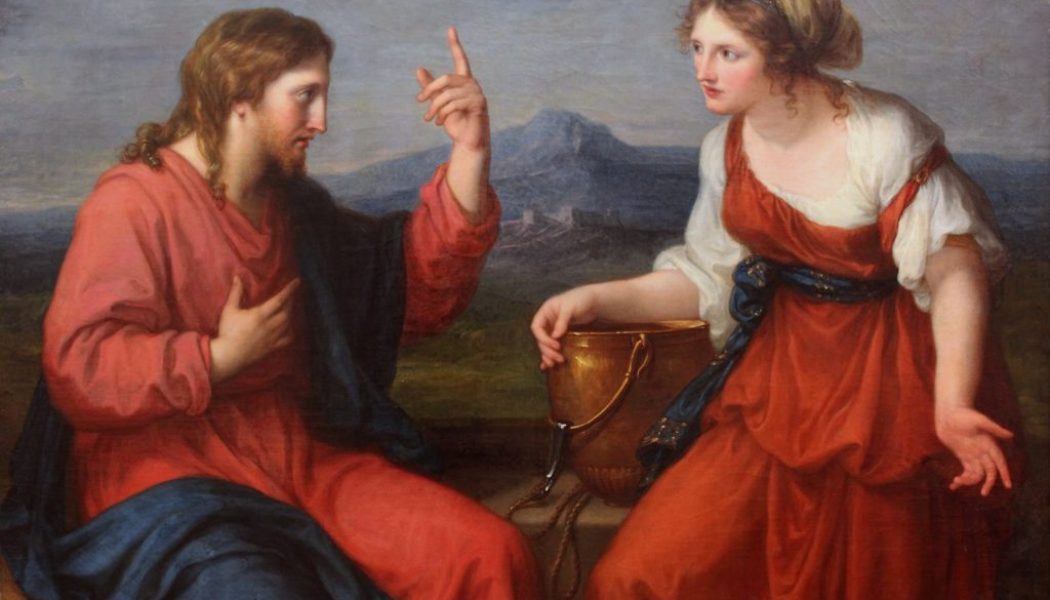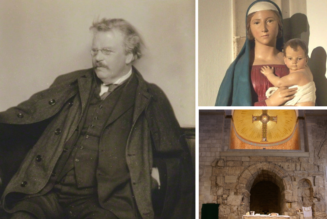
As we examine the Gospel for this weekend’s Mass we do well to understand that is about human desires and how the Lord reaches us through them. Prior to examining the text in detail, let’s consider a few things:
- What it is that really makes you happy? We desire so many things: food, water, shelter, clothing, and creature comforts. We long for affection, peace, and a sense of belonging. Sometimes we want stability and simplicity, at others we yearn for change and variety. Our hearts are a sea of desires, wishes, and longings. Today’s Gospel says that a woman went to the well to draw water. She represents each one of us and her desire for water is symbolic of all our desires.
- In reality, your desires are infinite. Can you remember a time when you were ever entirely satisfied, when you wanted absolutely nothing else? Even if you can recall such a time, I’ll bet it didn’t last long. That is because our desires are without limit.
- The well in today’s Gospel symbolizes this world. Jesus says to the woman, Everyone who drinks of this water will thirst again. The world cannot provide what we are really looking for. No matter how much it offers us, it will never suffice, for the world is finite while our desires are infinite. In this way our heart teaches us something very important about ourselves: We were not made for this world; we were made for something, someone, who is infinite, who alone can satisfy us. We were made for God.
- The water offered is the Holy Spirit. Jesus said elsewhere, “If any one thirst, let him come to me and drink. He who believes in me, as the scripture has said, ‘Out of his heart shall flow rivers of living water.’” Now this he said about the Spirit, which those who believed in him were to receive (Jn. 7:37-39).
- The Catechism of the Catholic Church has this to say about the meanings of our longings:
The desire for God is written in the human heart, because man is created by God and for God; and God never ceases to draw man to himself. Only in God will he find the truth and happiness he never stops searching for. … With his longings for the infinite and for happiness, man questions himself about God’s existence. In all this he discerns signs of his spiritual soul. The soul, the seed of eternity we bear in ourselves, irreducible to the merely material, can have its origin only in God (Catechism # 27, 33).
- Scripture speaks to us about our desires: Of You my heart has spoken: “Seek His face.” It is your face O Lord that I seek; hide not your face! (Psalm 27:8-9). Only in God will my soul be at rest, he is my hope, my salvation (Psalm 62:1).
- Augustine wrote these classic words to describe our truest longing: “Thou hast made us for Thyself, O Lord, and our hearts are restless till they rest in Thee” (Confessions 1,1).
With these in mind, let’s look at the journey that this woman makes to Jesus. Things start out rough, but in the end she discovers her heart’s truest desire. The journey is made in stages.
Rendezvous – Notice that Jesus is the one who takes the initiative here. As the Lord teaches elsewhere, It was not you who chose me, It was I who chose you (John 15:16). Jesus encounters a woman from Samaria at Jacob’s well. She desires water, but Jesus knows that her desire is for far more than water or in fact anything that the world gives. Her desire has brought her face to face with Jesus. It is a holy and fortunate rendezvous. Jesus begins a discussion with her about her heart’s truest longing.
Request – The discussion begins with a request. The text says, It was about noon. A woman of Samaria came to draw water. Jesus said to her, “Give me a drink.” Imagine, God asking you for anything; what a stunning thing! What can she or anyone really give God? The answer is simply this: the gift of our very self. God has put a threshold before our heart that even He will not cross unless we first say yes to Him. Jesus’ request initiates a discussion, a dialogue of two hearts. As we shall see, the woman struggles with this dialogue. To be sure, it is a delicate, even painful process for us to accept the Lord’s invitation to self-giving. Something within us makes us draw back in fear. Scripture says, It is an awesome thing to fall into the hands of living God (Heb 10:31).
Rebuke – Sure enough, she draws back with fear and anger. She says, “How can you, a Jew, ask me, a Samaritan woman, for a drink?”—For Jews use nothing in common with Samaritans. In our journey to God, we do not always trust or understand Him at first. Some are afraid to relate to God because they think they will lose their freedom or that they will have to change too much. Others loathe the commandments or fear that they cannot keep them. Still others are angry at the unexpected twists and turns of life and do not want to trust a God who doesn’t always give them what they want. The woman’s anger is not really at Jesus; it is at “the Jews,” with whom the Samaritans have a hostile relationship. This is sometimes the case with God as well. It is not always the Lord Jesus, or God the Father, whom people hate or distrust; rather, it is Christians. Some have been hurt by the Church or by Christians; others have prejudiced opinions influenced by a hostile media and world.
Repetition – Jesus repeats His offer for a relationship. He says, “If you knew the gift of God and who is saying to you, ‘Give me a drink,’ you would have asked him and he would have given you living water.” I don’t know about you, but I am mighty glad that the Lord does not merely write us off when we say no to Him. Jesus stays in the conversation and even sweetens the deal by making an offer to give her fresh, living water. The Lord does the same for us. First He gave the Law, then He gave the prophets; now He gives His Son. It just keeps getting better. First He gave water, then He changed it to wine, and then He changed it to His blood. Despite our often harsh rejection of God, He keeps the dialogue going.
Ridicule – The woman is still hostile and now even ridicules Jesus: “Sir, you do not even have a bucket and the cistern is deep; where then can you get this living water? Are you greater than our father Jacob, who gave us this cistern and drank from it himself with his children and his flocks?” To the world, the teachings of God often appear to be foolishness. People often dismiss religious faith as fanciful and unrealistic.
Reminder – Jesus now re-frames the question by reminding the woman of the obvious: Everyone who drinks this water will be thirsty again. What she is relying on can’t come through for her. The world’s water does not satisfy us; the world’s delights are transitory. They promise ultimate satisfaction, but soon we are thirsty again. The world is the gift that keeps on taking; it takes our money, loyalty, freedom, and time, while giving us only temporary—and ultimately unsatisfying pleasures—in return. It’s a bad deal. Every one who drinks from this well be thirsty again.
Re-upping the offer – Jesus says, “… but whoever drinks the water I shall give will never thirst; the water I shall give will become in him a spring of water welling up to eternal life.” Here the Lord speaks of happiness and satisfaction that he will give, that grows in us and makes us more and more alive. The “water” he offers (as noted above) is the gift of the Holy Spirit. As the Holy Spirit lives in us and transforms us, we become more and more content with what we have. As the life of God grows in us, we become more alive in God and joyful in what He is doing for us. This is what the Lord offers us: the gift of a new and transformed life, the gift to become fully alive in God. I am a witness of this. How about you?
Result – The woman has moved toward Jesus; she has warmed to His offer. She says, “Sir, give me this water, so that I may not be thirsty or have to keep coming here to draw water.” Here is the result of the Lord’s persistence. Thank God that He does not give up on us. He keeps calling, even when we say no, even when we sin; He just keeps call our name!
Requirement – Jesus wants to give this gift, but first He must help her to make room for it. For the truth is that she has unrepented sin. A cup that is filled with sand cannot be filled with water. The sand must first be emptied out and then the cup cleansed. Thus Jesus says, “Go call your husband and come back.” The woman answered and said to him, “I do not have a husband.” Jesus answered her, “You are right in saying, ‘I do not have a husband.’ For you have had five husbands, and the one you have now is not your husband. What you have said is true.” Now she does what most of us do when we are in an uncomfortable spot: she changes the subject. She attempts to engage in a discussion about where to worship. Jesus is patient and answers her, but ultimately draws her back to the subject at hand: her heart and what her desires are really all about.
Reconciliation – At this point the conversation gets private; we are not permitted to listen in. It is just between her and Jesus. But whatever it was, she is elated and will later declare, “He told me everything I ever did.” There is no sense in her tone that Jesus was merely accusatory. Rather, it would seem that Jesus helped her to understand her heart and her struggle. An old song says, “I once was lost in sin but Jesus took me in and then a little light from heaven filled my soul. He bathed my heart in love and he wrote my name above and just a little talk with Jesus made me whole.” Here, Jesus reconciles her with God and with her own self.
Rejoicing – The woman left her water jar and went into the town and said to the people, “Come see a man who told me everything I have done. Could he possibly be the Christ?” They went out of the town and came to him.” Do not miss that little detail: she left her water jar. She left behind the very thing she was depending on to collect the things of the world. What is your “water jar”? What do you use to gain access to the world and to collect its offerings? For most of us, it is money. Scripture says, For the love of money is a root of all kinds of evil. Some people, eager for money, have wandered from the faith and pierced themselves with many griefs (1 Tim 6:10). At any rate, the woman is joyfully empowered to leave this enslaving water jar behind. Freed from its load, she is able to run to town and declare Jesus to others. Her joy must have been infectious, for soon enough they are following her out to meet the Lord!
This is the journey of a woman who represents each one of us. This is our journey, out of dependence, out of an enslaving attachment to the world. It is our journey unto Jesus, who alone can set us free. Here is our journey to understand that our desires are ultimately about God.
You can listen to this homily here: Just a Little Talk With Jesus.
I have it on the best of authority that as the woman joyfully journeyed back to town, she was singing this gospel song:
[embedded content]









